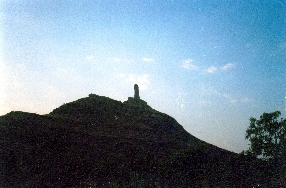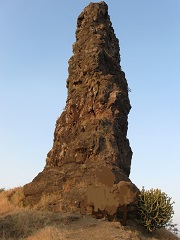|
Hadbichi
Shendi Climbing (25th Dec 2003)
 At
the beginning of the year 2003, I set a goal to complete five pinnacles
that year. Fortunately, I was able to attempt all five and successfully
completed four of them. The one I couldn't complete was due to a
natural calamity—an attack by honey bees. As far as Bhramanti's attempt
is concerned, we had tried to scale Hadbichi Shendi during Dussehra,
but the attempt failed due to a shortage of equipment. This time, we
were determined to succeed—barring any natural hazards. At
the beginning of the year 2003, I set a goal to complete five pinnacles
that year. Fortunately, I was able to attempt all five and successfully
completed four of them. The one I couldn't complete was due to a
natural calamity—an attack by honey bees. As far as Bhramanti's attempt
is concerned, we had tried to scale Hadbichi Shendi during Dussehra,
but the attempt failed due to a shortage of equipment. This time, we
were determined to succeed—barring any natural hazards.
On
24th December 2003, we gathered all the necessary equipment and reached
CST (Mumbai) to catch the Mahanagari Express. It was truly a nightmare
for all of us to board the train. One could witness a chain of
money-making activities at the station, involving: Coolies (porters),
Railway police, Hijras (transgender individuals soliciting money).
Although we tried our best to get into the train by any means possible
to get some rest before the climb, unfortunately, it didn’t happen.

We finally departed from CST at 12:15 AM on 25th December 2003 and reached Manmad Station at 5:15
AM. We rested at the station for a while, had tea and breakfast, and
then continued. From Manmad East, following the Manmad–Daund railway
direction, we took an auto-rickshaw to the base of the Hadbichi Shendi
Pinnacle. Locally, it is famously known as “Thumbs Up!” The pinnacle
resembles a samurai—its shape is truly unique. It took us 25 minutes to
reach the base..
After
some rest and route analysis by Deepak (our Climbing Manager), we began
the climb at 9:30 AM. I was the lead climber, Kiran was the second, and
Deepak was the third. There were pitons in decent condition along the
entire route.
In the first phase, there’s a tree that can be
used for anchoring, along with two pitons. After that, you need to
climb another 15 feet, where you’ll encounter three loosely stacked
rocks. You must stand on these loose rocks and perform a pull-up to
tackle an 8-foot boulder. A good piton is available at that point.
Next
is a straightforward 15-foot climb, where a bolt can be found for
anchoring. Upon reaching this spot, you have two options: carefully
tackle an overhang on the left or stretch and pull yourself up from the
right side of the ledge. I chose a slightly different route—I first
moved to the right, placed a piton, and then traversed left to navigate
around the overhang. I consider this one of the most satisfying moves
of the climb, as the exposure on both sides added a bit of
psychological pressure.
The final section was a tabletop move. I
reached the summit at 2:55 PM. A sturdy peg was already fixed
horizontally in the rock. Within the next 30 minutes, the rest of the
team had also reached the top. We had a photo session followed by a
short food break.
From the top—and even from the base
of the pinnacle—one can see several forts, such as Ankai and Tankai, in
the southeast direction.
We returned to the base by 4:30 PM,
packed up all our equipment, had lunch, and then descended to the
roadside. We walked for about an hour until we reached the railway
crossing; by then, it was already dark. Fortunately, we managed to get
an auto-rickshaw from the crossing to Manmad Station.
We also
caught one of the late trains—Kamayani Express—at 8:00 PM. Within five
minutes, we were all fast asleep and woke up at Kalyan. From there, we
reached home early the next morning.
From the top—and even from the base of the pinnacle—one can see
several forts, such as Ankai and Tankai, in the southeastern direction.
We
returned to the base by 4:30 PM, packed up all our equipment, had
lunch, and then descended to the roadside. We walked for about an hour
until we reached the railway crossing; by then, it was already dark.
Fortunately, we managed to get an auto-rickshaw from the crossing to
Manmad Station.
We caught one of the late trains—the Kamayani
Express—at 8:00 PM. Within five minutes, we were all fast asleep and
woke up at Kalyan. From there, we reached home early the next morning.
|